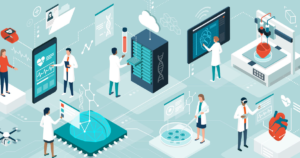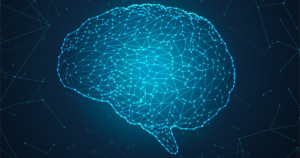AI in Healthcare: Advances and Applications
In the ever-evolving landscape of healthcare, a groundbreaking force has emerged, one that promises to revolutionize the way we perceive and experience medical care. This force is none other than Artificial Intelligence (AI). The impact of AI in healthcare is growing at an unprecedented pace, offering a glimmer of hope for improving healthcare systems and patient outcomes. In this article, we embark on a journey through the multifaceted realm of AI in healthcare, exploring its promises, potentials, and practical applications.
The Growing Influence of AI in Healthcare
The healthcare industry is no stranger to technological advancements, but the influence of AI is burgeoning rapidly. With its ability to process and analyze vast volumes of data, AI empowers healthcare professionals with tools to make more accurate and timely decisions. From diagnostics to treatment, AI is shaping the way healthcare is delivered, making it not just more efficient but also more personalized.
The Promise of AI in Improving Healthcare
One of the most tantalizing promises of AI in healthcare is its potential to enhance patient care. By harnessing the power of machine learning and data analytics, AI can assist in early disease detection, offer personalized treatment plans, and optimize resource allocation within healthcare institutions. But how did we arrive at this exciting juncture in the AI-healthcare journey?
Understanding AI in Healthcare

To appreciate the impact of AI in healthcare, we must first grasp the essence of artificial intelligence itself. In this chapter, we’ll delve into the core concepts of AI, its implications for healthcare, and the intriguing evolutionary path it has taken in this sector.
What is Artificial Intelligence?
At its heart, Artificial Intelligence refers to the development of algorithms and computer systems that can mimic human-like intelligence, allowing machines to perform tasks that typically require human intelligence. This entails reasoning, problem-solving, understanding natural language, and, importantly, learning from data. AI systems can autonomously adapt to new information and improve their performance over time.
AI and Its Impact on Healthcare
The influence of AI on healthcare is profound, encompassing a multitude of aspects, from diagnosis and treatment to operational efficiencies and patient engagement. AI augments the abilities of healthcare professionals by providing valuable insights, facilitating quicker decision-making, and even taking on tasks such as data analysis, freeing up precious time for medical personnel to focus on patient care.
The Evolution of AI in Healthcare
The story of AI in healthcare is one of continuous innovation. Over the years, AI has transitioned from being a mere buzzword to a tangible and transformative force in the medical field. The evolution has been marked by the development of various AI technologies and their applications, each bringing us closer to the realization of a healthcare system that is more efficient, accurate, and patient-centric.
Key Technologies in AI for Healthcare
To understand how AI is reshaping healthcare, we need to explore the core technologies that power it. In this chapter, we’ll dissect some of the fundamental AI technologies revolutionizing the healthcare sector.
Machine Learning and Deep Learning
Machine learning, a subset of AI, is the driving force behind many healthcare applications. It involves the use of algorithms that allow systems to learn from data and make predictions or decisions. Deep learning, a specialized form of machine learning, has enabled breakthroughs in medical imaging, diagnostics, and predictive analytics.
Natural Language Processing (NLP)
Natural language processing is the AI field focused on enabling computers to understand, interpret, and generate human language. In healthcare, NLP is instrumental in sifting through vast volumes of medical records, extracting relevant information, and assisting in clinical documentation.
Computer Vision
Computer vision empowers machines to interpret and analyze visual information, making it a game-changer for diagnostic imaging. From detecting anomalies in X-rays to assisting in surgical procedures, computer vision is paving the way for more accurate and efficient healthcare practices.
Robotics and Automation
AI-driven robotics and automation have found applications in surgery, rehabilitation, and even the delivery of medications within healthcare facilities. These technologies not only enhance precision but also reduce the physical demands on medical professionals.
Predictive Analytics
Predictive analytics uses historical and real-time data to forecast future events or trends. In healthcare, this translates into the ability to predict disease outbreaks, patient readmissions, and even medication adherence, allowing for proactive and preventive interventions.
Diagnostic and Imaging Applications

AI’s impact on healthcare is perhaps most evident in the realm of diagnostics and medical imaging. Let’s explore how AI is revolutionizing the way diseases are detected and diagnosed.
AI in Radiology and Medical Imaging
Radiology has been at the forefront of AI adoption in healthcare. AI-assisted image analysis can detect abnormalities in X-rays, MRIs, and CT scans with remarkable accuracy, reducing the likelihood of oversight and speeding up the diagnostic process.
Early Disease Detection
AI algorithms can identify subtle markers and patterns in patient data, enabling the early detection of diseases. This is particularly valuable in diseases like cancer, where early diagnosis can significantly improve treatment outcomes.
Pathology and Histopathology
In the realm of pathology, AI aids in the analysis of tissue samples, improving the accuracy of disease identification. Pathologists can leverage AI to reduce diagnostic errors and provide more precise and timely results.
The Role of AI in Cancer Diagnosis
Cancer diagnosis is an area where AI’s potential shines. Machine learning models can analyze medical images and patient data to assist in the identification and staging of cancer, guiding treatment decisions and improving patient prognoses.
Treatment and Personalized Medicine

Treatment and medicine are not one-size-fits-all, and AI is transforming healthcare by tailoring treatments to individual patients, among other applications.
Drug Discovery and Development
The process of drug discovery is notoriously time-consuming and costly. AI accelerates this journey by analyzing vast datasets to identify potential drug candidates, speeding up the development of novel therapies.
Personalized Treatment Plans
AI-driven algorithms can analyze patient data to create highly personalized treatment plans. This approach considers individual factors, such as genetics and lifestyle, to optimize treatment outcomes.
AI-Powered Surgical Assistants
In the operating room, AI-powered surgical assistants provide real-time guidance to surgeons, enhancing precision and reducing the risk of errors. These assistants can help in tasks ranging from suturing to robotic surgery.
Predictive Analytics in Disease Management
AI’s predictive analytics capabilities extend to disease management. By analyzing patient data, AI can predict disease progression, helping healthcare providers intervene proactively and improve patient outcomes.
Telemedicine and Remote Monitoring

Telemedicine and remote monitoring have gained prominence, especially in recent times. AI plays a pivotal role in making healthcare accessible and convenient for patients.
Telehealth Services
Telehealth services leverage AI to connect patients with healthcare professionals remotely. This not only improves access to healthcare but also reduces the burden on physical healthcare facilities.
Remote Patient Monitoring
AI-driven remote monitoring devices allow patients to track vital signs and other health metrics from the comfort of their homes. Healthcare providers can then access real-time data, enabling timely interventions.
AI-Driven Wearable Devices
Wearable devices equipped with AI algorithms can monitor a wide range of health parameters, from heart rate to sleep patterns. These devices empower individuals to take charge of their health and provide valuable data for healthcare professionals.
Enhancing Healthcare Accessibility
By eliminating geographical barriers and enabling more flexible healthcare delivery, AI in telemedicine is instrumental in enhancing healthcare accessibility. This is particularly significant in rural or underserved areas.
Electronic Health Records (EHR) and Data Management
Efficient data management is the backbone of modern healthcare, and AI is revolutionizing the way electronic health records (EHRs) are handled.
Improving EHR Efficiency
EHR systems, often criticized for their complexity, can benefit greatly from AI. Machine learning algorithms can streamline data entry, retrieve information more efficiently, and even assist in clinical decision-making.
Data Security and Privacy
As healthcare data becomes increasingly digital, protecting patient information is paramount. AI-driven solutions help safeguard EHRs by identifying potential security breaches and ensuring data privacy.
Population Health Management
AI aids in the analysis of population health data, identifying trends and risk factors that can inform public health strategies. This is particularly valuable for preventive healthcare measures.
AI-Enhanced Decision Support Systems
Clinical decision support systems use AI to provide healthcare professionals with evidence-based information and recommendations at the point of care, reducing medical errors and improving patient outcomes.
AI in Healthcare Operations
While AI is transforming clinical aspects of healthcare, it is also optimizing the operational side of healthcare institutions.
Hospital Management and Resource Allocation
Efficient resource allocation is essential for healthcare institutions. AI helps hospitals manage staff, equipment, and supplies more effectively, ensuring smooth operations.
Predictive Maintenance for Medical Equipment
AI-driven predictive maintenance minimizes equipment downtime by anticipating when machines need servicing or repairs. This is crucial for uninterrupted patient care.
Supply Chain Optimization
An efficient supply chain is critical for healthcare. AI optimizes inventory management, ensuring that medical supplies are readily available when needed.
Fraud Detection and Prevention
AI’s ability to detect anomalies and patterns in financial data is invaluable in the prevention of fraudulent activities within the healthcare system, safeguarding resources and maintaining the integrity of the healthcare industry.
Regulatory and Ethical Considerations

The integration of AI in healthcare brings forth regulatory and ethical considerations that require careful attention.
FDA Regulations and Approvals
The Food and Drug Administration (FDA) plays a pivotal role in regulating AI-based medical devices. Understanding the regulatory landscape is vital for the safe deployment of AI in healthcare.
Ethical Use of AI in Healthcare
AI ethics in healthcare involves ensuring that AI is used in a manner that upholds patient rights, maintains transparency, and avoids bias or discrimination.
Data Privacy and Patient Consent
As healthcare data is shared and processed, maintaining patient privacy and obtaining informed consent are crucial ethical and legal considerations.
Ensuring Transparency and Accountability
Transparent AI systems are accountable for their decisions. Ensuring transparency and accountability in AI healthcare applications builds trust and credibility.
Challenges and Limitations
While AI holds great promise, it is not without its challenges and limitations in healthcare.
Data Quality and Interoperability
AI is heavily reliant on high-quality data, and issues like data silos and interoperability can hinder its effectiveness.
AI Bias and Fairness
AI models may inadvertently perpetuate bias present in historical data. Addressing this bias and ensuring fairness in AI applications is an ongoing challenge.
Integration with Existing Systems
The integration of AI with existing healthcare systems can be complex and requires careful planning to avoid disruptions.
Resistance to AI Adoption
Healthcare professionals and institutions may resist AI adoption due to concerns about job displacement, lack of understanding, or a fear of change.
Future Trends and Innovations

The journey of AI in healthcare is far from over. Emerging trends and innovations promise to shape the future of healthcare in remarkable ways.
AI-Driven Drug Repurposing
AI is showing promise in repurposing existing drugs for new medical applications, potentially accelerating the development of treatments for various conditions.
Quantum Computing in Healthcare
Quantum computing, with its unparalleled computing power, holds the potential to solve complex healthcare problems, from drug discovery to genetic research.
AI in Pandemic Preparedness
The COVID-19 pandemic highlighted the need for better preparedness. AI is poised to play a critical role in early detection and response to future pandemics.
AI-Enhanced Mental Health Care
Mental health care stands to benefit from AI-driven solutions that can provide early intervention and personalized treatment plans for individuals facing mental health challenges.
Success Stories and Case Studies
Real-world examples and case studies illustrate the tangible impact of AI in healthcare.
Real-World Examples of AI Impact
Highlighting instances where AI has improved patient outcomes, reduced costs, or streamlined processes provides concrete evidence of its benefits.
Patient Stories and Testimonials
Hearing the experiences of patients who have benefited from AI in healthcare humanizes the technology’s impact and showcases its real-world relevance.
Collaborations with AI Companies
Collaborations between healthcare institutions and AI companies have led to groundbreaking innovations, underscoring the importance of partnerships in advancing healthcare.
The Road Ahead
As we look to the future, the road ahead for AI in healthcare is marked by continued growth and transformation.
Advancing AI Research in Healthcare
Ongoing research and development in AI promise to unlock new possibilities, further enhancing the role of AI in healthcare.
The Global Reach of AI in Healthcare
AI’s impact on healthcare is not limited by borders. It has the potential to address global healthcare challenges, making quality healthcare more accessible worldwide.
The Societal and Economic Implications
AI’s integration into healthcare has broader societal and economic implications, including changes in healthcare delivery, job roles, and the overall cost of care.
Conclusion
In conclusion, the transformative role of AI in healthcare is undeniable. From diagnosing diseases with unprecedented accuracy to streamlining hospital operations, AI is reshaping the healthcare landscape. While challenges and ethical considerations persist, the potential for a brighter future for healthcare, with AI at its core, is an exciting prospect. As AI continues to evolve, we can look forward to a healthcare system that is not only more efficient but also more compassionate, personalized, and accessible. The journey is ongoing, and the possibilities are boundless.
Frequently Asked Questions (FAQ) About AI in Healthcare: Advances and Applications
What is AI in healthcare?
AI in healthcare refers to the use of artificial intelligence technologies, such as machine learning and deep learning, to analyze medical data, assist in clinical decision-making, and improve patient care.
How does AI improve diagnosis accuracy?
AI can analyze medical images and patient data with high precision, helping healthcare professionals identify diseases, anomalies, and patterns that may be missed by the human eye, resulting in more accurate diagnoses.
What is predictive analytics in disease management?
Predictive analytics in disease management involves using AI to forecast disease progression and patient outcomes, enabling healthcare providers to intervene proactively and improve treatment strategies.
How does AI support personalized medicine?
AI tailors treatment plans to individual patients by analyzing their medical history, genetics, and lifestyle, optimizing treatment effectiveness and minimizing side effects.
What ethical considerations are associated with AI in healthcare?
Ethical concerns include data privacy, ensuring transparency in AI algorithms, and addressing AI bias to prevent discrimination in healthcare applications.
What challenges does AI face in healthcare adoption?
Challenges include data quality, interoperability, resistance to AI adoption, and the integration of AI systems with existing healthcare infrastructure.
How does AI enhance healthcare accessibility?
AI enables telemedicine, remote monitoring, and AI-driven wearable devices, making healthcare services more accessible to patients, especially in remote or underserved areas.
In our earlier discussion about the transformative role of AI in healthcare, we explored the promises and challenges of this cutting-edge technology. To delve deeper into the ethical aspects of AI in healthcare, consider reading our in-depth article on “Chatbots and AI: Enhancing Customer Service“. It provides valuable insights into maintaining patient data privacy and ensuring fairness and transparency in AI applications within the healthcare sector.
For a broader perspective on the latest trends and innovations in AI healthcare applications, we recommend visiting Medium. This reputable source offers up-to-date information on the most recent developments in AI, telemedicine, and healthcare technology, keeping you informed about the ever-evolving landscape of healthcare in the digital age. Stay updated with the latest breakthroughs in AI-driven healthcare by exploring their informative articles.




Uma resposta